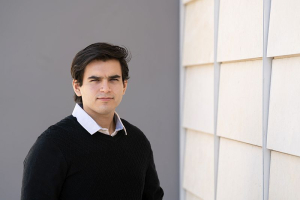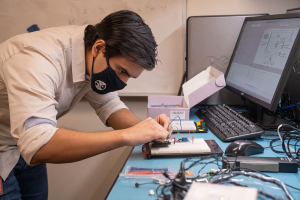Arturo Velazquez, a senior at the University of Houston’s Cullen College of Engineering, knows about the anxiety a medical issue can cause, and as a result, he’s attempting to make a difference by studying the field of Biomedical Engineering.
“My main motivating has always been helping people improve their health and give them hope of a better life,” he said. “I try using medicine-implementing engineering to find solutions to diseases or improving existing devices. A few years ago, I experienced a health scare while in Taipei. I was fortunate to only have a minor medical complication, but I could not stop thinking of the desperation people would feel hearing the other dreaded diagnoses. Having this in mind, I strive to create new technology in medicine and give people the hope they can overcome an illness and get healthy again.”
As part of that, for his capstone project he is creating a micro-device that interacts with the brain.
“My project is capable of sending electric signals to muscles or the brain in order to create contraction or sensation,” he said. “By doing so, we help patients suffering from stroke or spinal cord injuries strengthen their nerves by making a connection between thoughts to muscle contractions and movements. The device will be connected to a computer and a program we will create, in order to make it easy for anyone to modify the type, timing and intensity of the signal sent to the nerves, based on the patient’s needs.”
Velazquez has been recognized for his efforts in and outside of the classroom and research labs. In early 2020, he received the Most Active Member award from the UH chapter of the Society of Hispanic Professional Engineers, and also became the chapter’s Mentoring Coordinator.
Velazquez was also one of six 2020 UH student recipients of scholarships from the Great Minds in STEM program. He received the Villarreal Family Scholarship, sponsored by Raul and Cecile Villarreal. He is now looking forward to a Master’s program in Taiwan, to have a more global perspective of engineering, while also mastering his Mandarin and Japanese skills.
He highlighted several of his professors as being strong, positive influences on his studies while at UH.
“I have been fortunate enough to receive guidance and mentoring from many figures within the College of Engineering,” he said. “Dr. Metin Akay, the founder of the Biomedical Department, shares my same passion for engineering applied to medicine and believes in the future of these technologies. Dr. Sergey Shevkoplyas was my first professor at UH and taught everyone in my class the mindset to think outside the box to find the easiest solution to a problem. Dr. Nuri Ince gave me the chance to work on his research project, learning new ways to use today's technology to solve complex problems in medicine.”

